Brazil becomes a hot market for Chinese truck makers
Updated: 2014-04-14 05:36
By WANG CHAO in Beijing (China Daily Latin America)
|
||||||||
With Brazil busy preparing for the 2014 World Cup and the 2016 Summer Olympic Games, truck markers believe that large-sale infrastructure development for the events will spur demand for their trucks and pick-ups. And Beiqi Foton Motor Co, China's biggest commercial-vehicle manufacturer, is aggressively pursuing the market in South America and elsewhere.
Last week, Foton signed an agreement with its US partner, engine maker Cummins Inc in Columbus, Indiana, to invest $323 million to build manufacturing plants in Brazil and China, with a combined annual production capacity of 60,000 units. The plant in Brazil will make light trucks and pick-ups for the South American market.
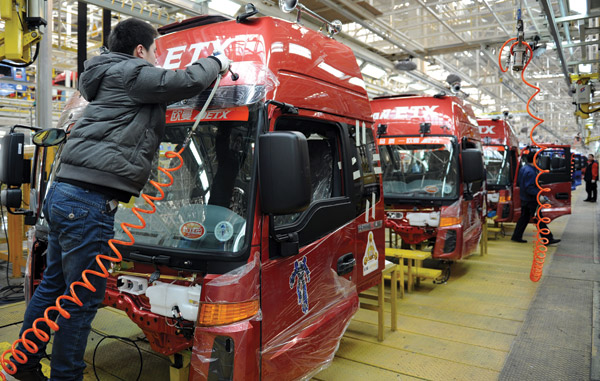 |
|
Foton's heavy-duty truck assembly line in Beijing. The company has announced that it will build a plant in Brazil. Provided to China Daily |
Brazil has overtaken Germany to become the world's fourth-largest auto market, according to Roland Berger Strategy Consultants. Although the Brazilian market is growing, foreign auto brands in the country face a government policy that protects domestic automakers. Since September 2011, the government has required them to buy at least 65 percent of their spare parts from local companies. Those who don't meet the requirement face an extra tax of 37 percent to 55 percent.
"This is certainly good news for those with local plants, but for those pure exporters, this can be difficult to expand the market share," said Zhao Jingguang, Foton's vice-president.
Vehicle sales are also increasing in other South American countries. Peru's automotive association said sales rose 8 percent to around 192,300 last year with Chinese brands taking 14 percent of the market, Japan 37 percent and South Korea 25 percent.
South Africa, the fourth-biggest regional market after North America according to Roland Berger, is another market for Foton. The company shipped 7,800 trucks and pick-ups to the country last year, 10 percent more than the previous year. Yang Aiguo, deputy secretary general of the China Chamber of Commerce for Import & Export of Machinery & Electronic Products, Automobile Branch, says the export volume to South Africa grew faster than in South American regions in 2012. But he said Brazil, Venezuela and Peru have "great potential. "
Last year, Foton's total overseas delivery was around 45,000 vehicles. Before 2011, the overseas market was far less attractive for Chinese truck manufacturers. They received few orders and the domestic market also was down. Now the domestic market is slowly picking up from weak sales in 2012, but it hasn't yet recovered to the sales level of 2010. "That's a main reason that forces truck makers to think beyond borders," said Wang Xiangyin, Foton's vice-president.
In 2010, Foton created an international market strategy known as "5+3+1". It means that by 2020 Foton will build factories in five overseas markets — India, Russia, Brazil, Mexico and Indonesia — each with a production capacity of 100,000 units. The plan also calls for breakthroughs in three mature markets — North America, Europe and South Korea-Japan — and building an R&D center in Beijing.
Zhao said international resources are vital to overseas development, and Foton has two strong partners, Cummins and Daimler.
In 2012, Foton and Daimler formed a joint venture to produce medium-sized trucks with a Mercedes engine. Zhao said the partnership not only brought technologies to Foton, but also global networks. "In the future, when the joint-venture products are exported, Daimler can help build distribution networks around the world," he said.
Foton also signed an agreement with Cuba's transportation ministry to start a demonstration project of its new energy vehicles. The company said it will enter the Cuban market in the next few years with all its models, including vans, light trucks and pick-ups.
To build its brand, Foton is using popular sports events. Earlier this year, it sent a racing team and two pick-ups to the Dakar Rally for the first time. Previously, only one Chinese company pick-up maker Great Wall Motors had participated. "Although this didn't generate direct money for us, it can be a name card of our product," said Wang.
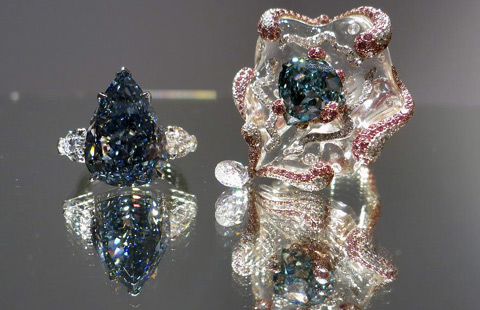
 Christie's to auction dazzling diamonds
Christie's to auction dazzling diamonds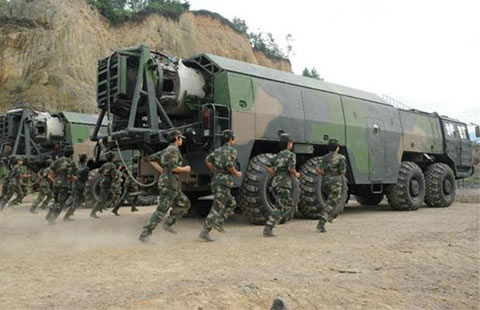
 Women's missile unit joins China's army
Women's missile unit joins China's army
 Coldest marathon: a song of ice and fire
Coldest marathon: a song of ice and fire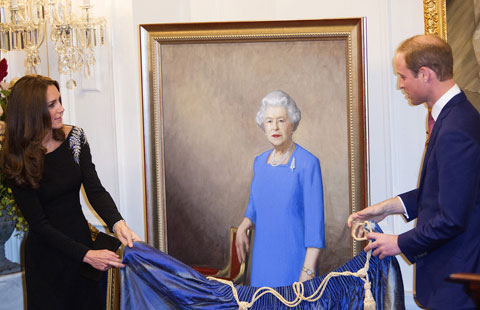
 Prince William, Kate unveil portrait of Queen Elizabeth
Prince William, Kate unveil portrait of Queen Elizabeth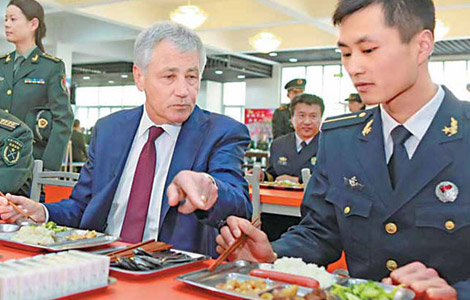
 Hagel gets recipe of goodwill
Hagel gets recipe of goodwill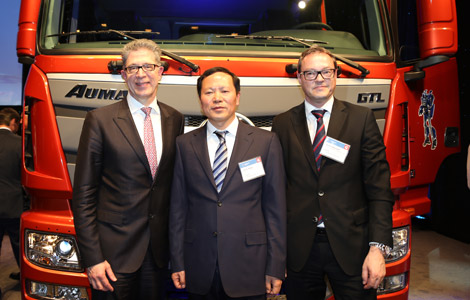
 US, China firms team up on green truck play
US, China firms team up on green truck play
 21 injured in Pennsylvania school
21 injured in Pennsylvania school
 Bakers perform with dough in pizza championships
Bakers perform with dough in pizza championships
Most Viewed
Editor's Picks

|

|

|

|
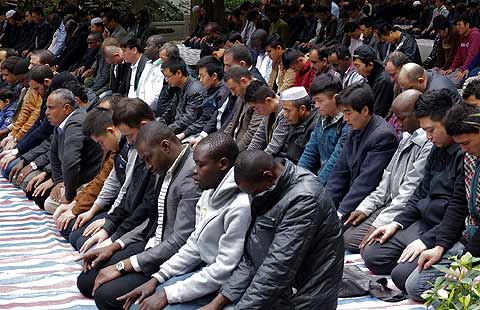
|

|
Today's Top News
Experts discuss about custody of black box
China protests Japanese minister's visit to war shrine
China's financial reforms 'not tough one'
Boao Forum focuses on 'growth drivers' for Asia
Texas firm offers costly air purifier
NBA to play games in China
'Shared responsibility' emphasized
China's envoy: 'Yes, we can!'
US Weekly

|

|







